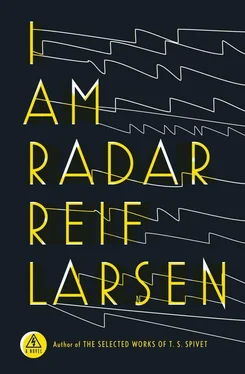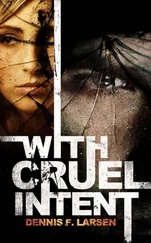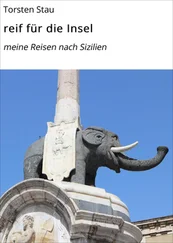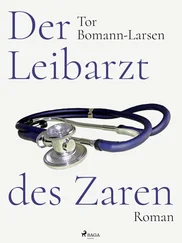Fig. 1.4. The Treriksrøysa
From Røed-Larsen, P., Spesielle Partikler, p. 140
“As you wish.” He smiled. “But I’m sorry, I’m being a terrible host. You must be exhausted from your travels. Would you like a sauna? I find it’s the only way to cure jet lag.”
Caught between a haze of weariness and the urge to follow local custom, Kermin and Charlene, against their better judgment, found themselves stripped and sweating alongside Leif inside a small sauna cabin on the outskirts of camp while Radar slept outside on a blanket in the grass.
The ticking of the sauna’s furnace and the resonant smell of the baking cedar planks overwhelmed Charlene’s fragile system. She tried to let the heat perform its restorative magic but found it difficult to relax while naked inside a small, sweltering room alongside this stranger. She peeped out through the little window in the door to see if her son was still there, then she cinched the towel tighter around her breasts.
“So how do you know Brusa Tofte-Jebsen?” she asked.
“Brusa and I taught together in Bergen before the war,” said Leif. His hairless body glistened pink, his small penis a little mole rat of a thing, which she tried to avoid with her eyes. He did not seem to be sweating.
“I have been to Bergen,” said Kermin abruptly.
“Oh?” said Leif. “A beautiful place, isn’t it?”
“I don’t remember,” said Kermin. “It was night and I am sick. We escaped to America. We were not tourists.”
“Ah, well, that’s a shame. It’s funny how beautiful towns can turn very ugly in difficult times. You forget to look at the views, you know what I mean?”
“Then you moved up here?” said Charlene.
“When the Nazis invaded, I had just started my first year teaching physics and chemistry in high school. You can’t imagine what it’s like to be occupied. We all wanted to join the resistance but didn’t know how. It was like a slow death. A silent death. We did simple things, stupid things, like wearing paper clips on our lapels as a sign of protest. We started underground newspapers, declaring all kinds of things. Suddenly you had a newspaper, so you had to have radical ideas to go in the newspaper. Many people think the idea comes first, but it’s usually the other way around. You need a place to put the idea before you can have the idea, you know what I mean? But the real turning point was when the quislings wanted all of us teachers to sign a declaration of allegiance. The declaration stated we could only teach Nazi-sponsored topics and such. So we saw our chance — we would take a stand and break our silence. We refused to sign the document. All of us. Without even consulting each other. Seven hundred teachers were arrested, rounded up, and sent up the coast on a small boat. It was packed to the ceiling. Many of them got very sick on the journey. Some even died. Brusa and I worked for a year in the camp up here in Elvenes. Heavy labor. It was freezing; terrible conditions, you know. But we started a few interesting projects in secret, and after they released us, a couple of us ended up staying. And now I have been here for over thirty years.”
“Brusa lives here, too?”
“No, he ended up leaving. A disagreement over language.” Leif dipped a wooden ladle into a bowl of water and poured it over the stones. A great wall of wet heat rose up and enveloped them.
“Ay,” said Charlene. Her head felt as if it were compressing.
Leif did not seem to notice her distress. “You see, here in Norway,” he said, “there are actually two languages, two different types of Norwegian — Nynorsk and Bokmål. To an outsider, the differences between them might seem minimal, but there have been years of turmoil and cultural warring over who should speak what, and which is the true language and which is not. It’s all a bit silly — I can say this to you now — but back then it mattered a great deal whether ‘I’ was jeg or eg . Somehow everything else depended upon this distinction. Did you say jeg ? Or did you say eg ? There could be no compromise.”
“So what did Brusa say? Jeg or eg ?” she asked, trying to breathe normally.
“Without boring you with the specifics, as a group we chose to speak Nynorsk, which was the language invented for the people, not the elite, who all spoke Bokmål. Bokmål is really a kind of bastardized Danish. And Brusa didn’t like this decision, even though we took a vote and it was all done completely democratically. He thought Nynorsk was one man’s fantasy. So he left. To tell you the truth, I don’t think he ever wanted to stay. He was a different breed than I was. He wanted to be a writer. Some people are meant to do things, and some people are meant to write about these things from a great distance.”
The heat was beginning to get to her. She ran a finger across a sweat-soaked eyebrow.
“Brusa seems to admire you a lot,” she said. “He was the one who recommended we come here.”
“Yes, well, from afar, one can admire one’s nemesis.”
“Nemesis?”
“Perhaps this is a bad translation. In Norwegian we say konkurrent . And this means ‘opponent,’ but it also means ‘someone who is a part of you.’”
“Your English is very good.”
“Of course,” he said. “I’m Norwegian.”
She suddenly had the urge to ask Leif about Per Røed-Larsen and why he might not have wanted them to come, but then she would have had to reveal to Kermin that she had kept the telegram from him. She would have to acknowledge that the telegram had been real.
Instead she said: “So you started a school up here?”
“Not quite,” Leif said. He dipped the ladle into the water again. Charlene wanted to tell him not to do it, but he was already dousing the rocks. The air grew thick with vapor. Charlene’s head started to swim. “At first, when the war was still on, it was a resistance movement. But not with weapons. We were interested in issues of atomics, theater, the avant-garde. You know, we were still young then. We thought we could change everything by staging a little happening about nuclear fission and cultural decimation on the tundra. There was no audience. No one even knew we existed. But I’ve come to learn that this isn’t how you win a war. And it isn’t what the people needed. At the end of the war, this whole area was completely destroyed by the Nazis. Can you imagine? First there was a town, and then there was nothing. Just ashes, bent metal, these terrible memories. For a while there, that’s all there was up here. Terrible, terrible memories. We are lucky memories die with those who have them.”
The heat was causing Charlene’s vision to collapse in on itself.
“I’m sorry. I can’t do it anymore. I have to get out,” she said. “I’m going to check on Radar.”
“Yes, it takes some getting used to,” he said. “But it will cure you of almost anything. I hardly notice the heat anymore.”
To her horror, she found Radar asleep amid a swarm of mosquitoes. How stupid she had been to leave him unattended! She swatted angrily at the insects. Attacking her poor, helpless child — how dare they? The mosquitoes responded to her attacks by gleefully turning their attention to her.
“I’m sorry,” Leif said, emerging from the sauna pink and steaming. “I should’ve warned you about the myggs . They can be nasty this time of year. They have a short period to do their damage, and they take their job very seriously. A reindeer can lose two liters of blood per day.”
They flip-flopped back to the main lodge. Now, suddenly, all Charlene could think about were the swarms of mosquitoes dive-bombing their heads. She protectively enshrouded Radar with a towel as they passed a group of men filming what looked like a collection of headless, green-skinned dolls.
Читать дальше












